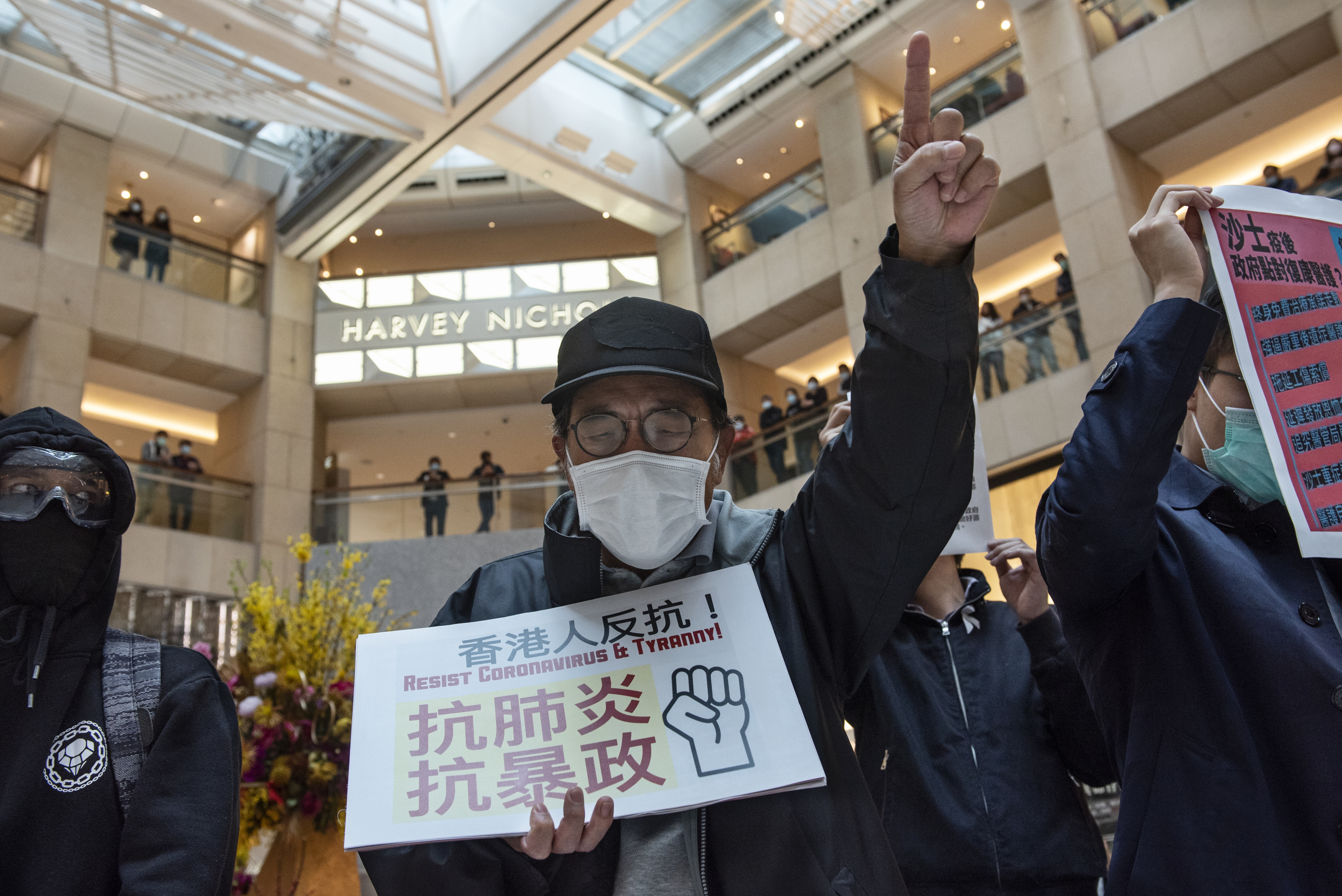Hong Kong Struggles with Coronavirus, Renewing Residents’ Anger

A demonstrator holds a placard during a Feb. 2 protest calling on Hong Kong's government to close its border with China. (Miguel Candela/SOPA Images/LightRocket via Getty Images)
For eight months, pro-democracy protesters have clashed with police on the streets of Hong Kong. Often clad in black, they wear facemasks to protect their identities — a move the government has attempted to ban.
Early this year, an outbreak of a new coronavirus appeared in mainland China. The virus quickly spread — first to neighboring Thailand and Japan, and eventually to Hong Kong in late January.
On Feb. 5, Hong Kong’s Chief Executive Carrie Lam appeared before the cameras wearing a green facemask of her own — and appealed to the protesters to set aside their differences. “This is a time really for social cohesion, for getting our act together in order to fight this disease,” she said. She also lauded her government’s swift action. “Since we were first notified of this virus in the last month or so, we have been very vigilant.”
But as the number of cases in the semi-autonomous city have continued to rise, so too has the level of anger at Lam’s response. As of Feb. 11, Hong Kong had 49 confirmed cases of the virus. Many in Hong Kong, including those who formerly supported the Beijing-backed regime, are furious that Lam hasn’t yet sealed its border with mainland China and failed to provide enough face masks for residents, said Vivienne Chow, a Hong Kong journalist and cultural critic.
“I would argue that the protests have evolved to a new stage,” she said. “Street actions of the protests might have calmed down due to the virus, but the protests have sown the seeds for resistance.”
Unlike nearby Singapore and Taiwan, where governments have distributed masks to most citizens, Hong Kong residents must line up to purchase their own. They are now “queuing day and night” for any medical-grade masks they can find, said Ryan, a doctor at a public hospital in Hong Kong who asked to be identified only by his first name for fear of reprisals. “We do not even have enough protective gear in the hospital.”
Speaking to FRONTLINE via an encrypted messaging app, Ryan said boxes of 50 masks that sold for $8 to $10 before the outbreak are now selling for between $100 to $300. Desperate and scared Hongkongers have been undeterred by the sky-high prices; according to Chow, many stores are now sold out.
Last week, Lam ordered government officials to stop wearing masks, which are in limited supply around the world, to ensure there are enough to protect frontline workers. “The goal is to save stocks for medical staff,” she said. Meanwhile, Hong Kong prisons, which manufacture the masks by the thousands, have been ordered to ramp up production.
This perceived mismanagement has caused a wave of fresh anger against the government, even from residents who previously supported Lam. “Now even some blue ribbons” — those who oppose the pro-democracy protests — ”claim they would join protests against the government if there is any in the future,” Ryan said.
There are already signs that may be the case. On Jan. 26, pro-democracy protesters joined forces with pro-government protesters to stop a government plan to use an empty public housing complex as a quarantine facility. After two homemade bombs went off — one in a hospital, the other in a checkpoint bathroom — an anonymous online message circulated on Telegram took credit and promised “more real bombs” if Hong Kong’s borders with China weren’t completely closed.
Last week, on Feb. 3, thousands of medical workers went on strike, demanding the border be shut down. Ryan, who belongs to the group of medical workers leading the strike, chose not to join in out of obligation to his patients, but said he shares their frustration. “Anger probably ranks at the top,” he said. “I personally think that the government is just really incapable of doing anything to help the citizens here.”
On Feb. 4, a new wave of protesters — some rallying in solidarity with medical workers, others against the government — took to the streets. Local news reports said riot police fired tear gas and used rubber bullets and pepper spray to disperse the groups.
The government issued a press release condemning the “masked rioters,” whom it accused of blocking a street, vandalizing a store and throwing bricks outside a shopping center.
Two days later, officials announced a mandatory 14-day quarantine on everyone entering the city from the mainland. Soon after, under public pressure to get back to work, the medical workers voted to end their strike, although the group’s chairperson, Winnie Yu Wai-ming, vowed to continue to fight for better protections and full closure of the border. Scared for themselves and their families, said Ryan, many doctors and nurses have simply resigned.
Meanwhile, the memory of 2003’s SARS outbreak — which killed nearly 300 people in Hong Kong — hangs heavily on the city’s residents, said Vincent, a high-school student and protester featured in the new FRONTLINE film Battle for Hong Kong. As Hongkongers focus on keeping their families safe, many are now “less passionate” about the protests, he said, although continued “rough tactics” by police have won over new allies.
“The movement is still continuing,” agreed Agnes Chow, a 23-year-old protest leader who also appears in the film. But, she added, “the coronavirus has become the main issue.”
— Gesbeen Mohammad and Ieong Kin Pong contributed reporting.





